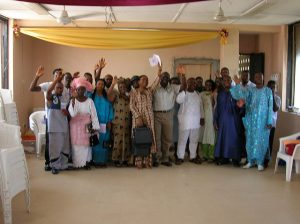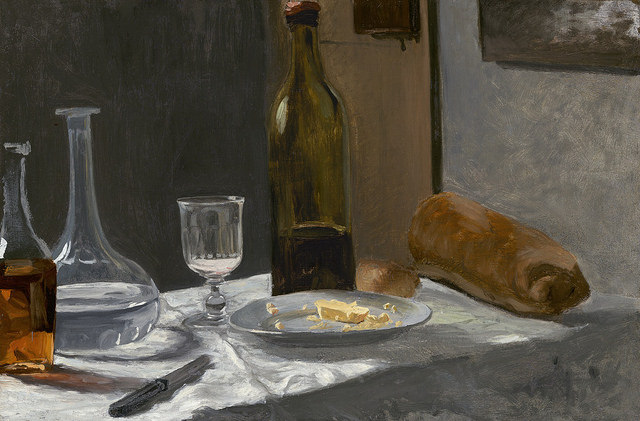Revised Common Lectionary Reflection, Thirteenth Sunday after Pentecost, Proper 15, Year B
August 19, 2018
Lessons: Proverbs 9:1-6; Psalm 34:9-14; Ephesians 5:15-20; John 6:51-58
Theme: God’s faithful and generous people, as careful stewards of God’s promises, choose to feast on the bread and wine of wisdom.
Key Scriptures: To those without sense she [Wisdom] says, “Come, eat of my bread and drink of the wine I have mixed. Lay aside immaturity, and live, and walk in the way of insight.” Proverbs 9:4b-6
“This is the bread that came down from heaven, not like that which your ancestors ate, and they died. But the one who eats this bread will live forever.” John 6:58
Preaching/Teaching Reflection
Americans today are not known for their healthy eating habits. A flurry of documentary films, such as Forks over Knives and The Weight of the Nation, offers a grim picture of our poor eating  habits. Whether one agrees that much of the food we eat is killing us, it is fact that the food on our dinner plates will not keep us alive forever. Though it is tempting to think we have control over our destiny through diets, superstar promises and overpriced products, or total avoidance, the only bread that provides lasting life is wise bread.
habits. Whether one agrees that much of the food we eat is killing us, it is fact that the food on our dinner plates will not keep us alive forever. Though it is tempting to think we have control over our destiny through diets, superstar promises and overpriced products, or total avoidance, the only bread that provides lasting life is wise bread.
What is this wise bread? Is it made from the refined high protein cricket powder with 12 organic, non-GMO nuts and seeds? Hardly! Can I find it at Whole Foods? Perhaps you could pick out a nice loaf of bread there, but there’s more to wise bread than simply selecting a loaf and paying for it. You see, wise bread has no standard recipe, can be found wherever followers of Jesus gather, and is handed out in small bites and followed by a sip or wine or grape juice. This bread can show up in a variety of forms ranging from paper-thin wafers to hearty unleavened wheat rounds, and from rice cakes to tortillas. I even know of one occasion when wise bread showed up on the table in the form of a child’s Easter bunny sugar cookie (someone forgot to bring the bread for communion).
All well and good, some of you may be thinking, but what makes this meal so life-giving and wise? Why should I show up on a given day and hold out my hands for this bread from heaven when there are so many other options available to me on any given day? And what’s all this in John’s gospel about noshing on Jesus? Didn’t someone way back when even accuse Jesus followers of cannibalism?
John invites us to think outside the box, to stop being so literal, and to encounter Jesus in signs and wonders and holy mystery. John assumes that we can be creative in envisioning our relationship to Jesus and to one another in the beloved community. If we can suspend our disbelief, there’s a rich opportunity awaiting us at our Lord’s table.
There is no last supper in John’s gospel, although the language of this five week “bread cycle” certainly intimates the Eucharist. Even that high point of our worship has to be approached in an out-of-the-box manner to fully appreciate Jesus’ words this week.
One tack a preacher or teacher might take is to compare Jesus’ instruction to consume his body and blood as being “all in” as a disciple. Think of the language describing someone who is over-the-top gung-ho about something: “She just eats and drinks poetry,” or “He drinks in jazz like a bottle of the finest wine,” or “They eat each other’s love right up.” You get the idea.
 If we think of ourselves as Christ’s body here on earth—the church—then we are fully invested in Jesus. We’re so invested, in fact, that we embody him, reflecting his love and grace through our words and actions to a hungry and hurting world. We are nourished together, every living cell of our individual bodies and our collective Body, by all that Jesus is. We chew on every scene from his ministry and drink in deeply his love for us, a love that transcended even a horrible politicized death.
If we think of ourselves as Christ’s body here on earth—the church—then we are fully invested in Jesus. We’re so invested, in fact, that we embody him, reflecting his love and grace through our words and actions to a hungry and hurting world. We are nourished together, every living cell of our individual bodies and our collective Body, by all that Jesus is. We chew on every scene from his ministry and drink in deeply his love for us, a love that transcended even a horrible politicized death.
Yes, to dine on wise bread, we have to let go of rational thought and simple explanations, and grow into the Body of Christ in all its fullness and rich variety. As Wisdom reminds us, “Lay aside immaturity, and live, and walk in the way of insight.” It’s a countercultural and counterintuitive approach to life, to faith, and to being Christ’s Body in this world. Let go to live. Eat and drink deeply. Be nurtured with wise bread.
In Worship
Invite worshipers to try a little poetry today as a way to explore the concept of wisdom. You might try an acrostic poem using the letters for WISDOM or a simple five-line cinquain. Be sure to be ready to provide a sample to get their creative juices flowing. The rich language and word play of poetry can be a great way to get worshipers to see John’s gospel in fresh light and to understand the reading from Proverbs.
With Youth
Take a closer look at this week’s lesson from Ephesians, particularly verse 16. What does it look like to “make the most of time”? Are the days evil today as Paul says they were in the first century? What kinds of comparisons can you make? How is today different? The last four verses offer some advice about how to make the most of time and how to be wise. Invite conversation about Paul’s instructions.
With Children
Wisdom Sets Her Table
Invite someone in the congregation to portray Wisdom and interview her about how she sets her table and invites the simple in to eat bread and drink wine so that they can live well. Let the children ask her questions. Have “Lady Wisdom” suggest how the children might set a wise table and learn to live well. Finish with a simple prayer.
Weekly Stewardship Bulletin Insert
As followers of Jesus at [insert name of congregation], we are Christ’s Body in this place and time. In addition to gathering around our Lord’s Table for communion, we are to be good stewards of this Body of which we are all a unique part. Ponder how you can be fully invested in this life of discipleship and work of ministry.
Stewardship at Home
This week take the psalm and spend the week reviewing and pondering a verse every day. Try to use as many of your senses as possible in this effort—art, music, sight, sound, scent, and taste. Consider journaling, drawing, cooking, engaging in conversation with others about these verses. At the end of the week, review your efforts and consider how the psalm informs wise living and being fully invested as a follower of Christ.
Here’s a look back at our 2015 Lectionary Reflection: https://www.stewardshipoflife.org/2015/08/hungry-hungry-humans-and-the-bread-of-life/
Here’s a look back at our 2012 Lectionary Reflection: https://www.stewardshipoflife.org/2012/08/we-are-what-we-eat/
Photos: Claude Monet, That Other Paper, and Shiraz Chakera, Creative Commons usage license. Thanks!
Note: Reprint rights granted to congregations and other church organizations for local, nonprofit use. Just include this note: “Copyright (c) 2018, Rev. Sharron Blezard. Used by Permission.” Other uses, please inquire: thewritelife@hotmail.com.




Leave a Reply